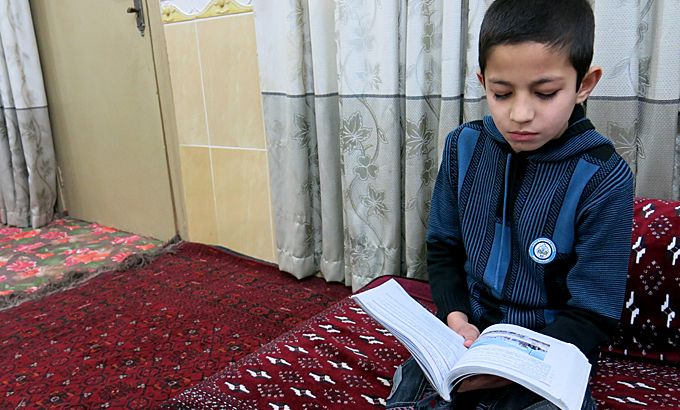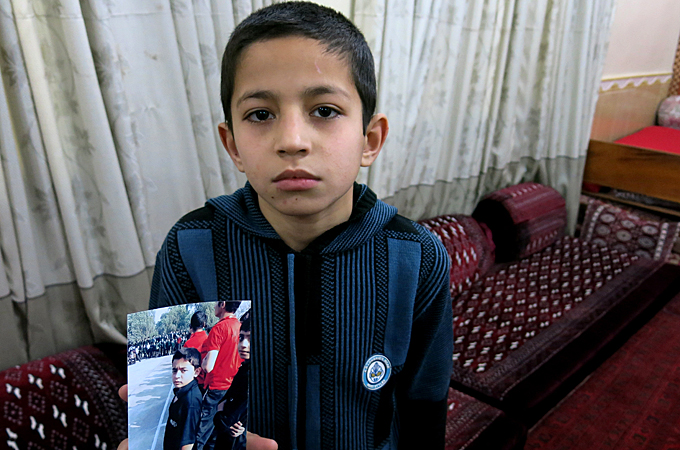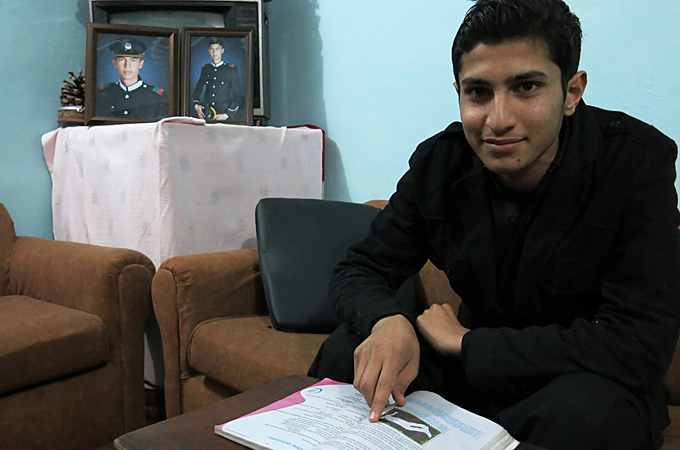Peshawar students vow to fight Taliban
As school where Pakistani Taliban killed 149 last month reopens, defiance marks response to continued threats.

Peshawar, PAKISTAN – Peshawar’s Army Public School, the site of a massacre that killed 149 people almost a month ago, has reopened amid tight security in the capital of Pakistan’s Khyber Pakhtunkhwa province.
Helicopters flew overhead early on Monday morning while dozens of army soldiers patrolled the streets around the school, tightly screening entry and exit points to the school compound.
Keep reading
list of 4 itemsPolice and soldiers killed as more violence flares in northwest Pakistan
Pakistan military says four fighters killed near Afghanistan border
How is Pakistan dealing with the security threat from Afghanistan?
Grim-faced soldiers stood guard as hundreds of children and their parents streamed into the school, where a memorial service was held in the presence of the country’s army chief, General Raheel Sharif.
The mood among the students was sombre but defiant as they entered the premises.
Many of the children were brought to the school in army lorries, which doubled up as school buses on this, the first day of school in the new year.
Access to the school was tightly controlled, with army soldiers standing guard on several pickets and machine gun nests established in the streets around the school, and as well as the graveyard immediately adjacent to it.
In the days since the attack, the school’s walls have been refortified, with spools of razor wire wound around the perimeter.
A second perimeter wall, about 50m from the main entrance, has also been erected, in addition to new CCTV systems.
Particular attention was paid by security forces to the locality behind the school, from where at least seven armed men broke into the premises on December 16, in an attack that saw them go room by room, killing 149 people in all, the deadliest attack in Pakistan’s history.
Executed in classrooms
More than 130 of those killed were students, many of them executed in their classrooms and in the school’s main auditorium.
In the wake of the attack, Pakistan lifted a moratorium on executions in what it called “terrorism cases”, and constituted military courts to try said cases.
The army also stepped up ongoing military operations in the country’s tribal areas, where troops have been battling the Tehreek-e-Taliban Pakistan (TTP) and its allies since June.
The TTP claimed responsibility for the attack on the school in Peshawar, saying it was carried out in “revenge” for the alleged killing of women and children in the tribal areas by the military.
“I think it is a good thing that the school is reopening,” Tariq Aziz, 30, whose younger brother, Asad, was killed in the attack, told Al Jazeera.
“Already time has been wasted, and the students’ studies are suffering.”
“Even if we are not safe, what can we do? We have to send our children to school. For the sake of their education.”
Hasan Syed, 10, survived the attack, and was one of those who went back to the school on Monday.
“I will not be afraid of going back – I will go back to the school,” he told Al Jazeera.
“This determination is because my cousin [Asad Aziz] was martyred. If I go to school, it is like I am challenging the terrorists.”
Real gunfire
Zahid Ayub, 15, was in the auditorium when the attackers broke in. He said he and his friends had initially dismissed the sound of gunfire by joking about it.
“Once they killed the ones who were running away, then they came row by row and started firing,” he told Al Jazeera, recalling how he and his friends dropped to the ground as soon as the realised the gunfire was real.
| ||
“My three friends were with me. When they came to our row, they started firing. I was looking down, at the ground, but when I looked up, one of them was bleeding from the leg. The other, he got up slowly and then he was hit by a bullet in the face.”
That boy’s name was Azhar Naseer, and he would not survive the attack.
As Ayub starts naming his friends who died in the massacre, he reaches ten names, before his memory begins to fail him. There are many more, he assures me.
“When I saw my friends pictures on the television [after escaping], I thought that these were the same people who used to say to me that some day they would be famous and recognised by everyone […] they wanted to be popular. And now, they’re not in this world anymore, but everyone knows them.”
Ayub was able to escape by playing dead, and running to find shelter in a classroom when the attackers moved on to a different building in the school.
“I was just praying the entire time, in the classroom and the hall. I felt those were my last moments alive.”
The reopening of the APS and other schools across Pakistan has been delayed several times, as authorities race to verify that adequate security arrangements are in place.
Safety approvals pending
On Monday, thousands of private and public schools reopened across the country, but many others remained shut, as the government had not yet issued them with certificates of approval for commencement of classes.
In Peshawar, 118 schools reopened on Monday, while a further 1,380 remained closed, Ijaz Ahmad, city police chief, told Al Jazeera.
Schools had been advised to fortify their boundary walls, and to hire professional security staff, Ahmad said, as the police did not have the numbers to cover every school.
“I have 1,980 policemen, and there are 2,037 private schools – that’s not including government schools,” said Ahmad, whose force secures Peshawar’s population of more than 3.5 million people.
“So even if I want to give them a policeman in every school, I can’t do it!”
If it’s recruits that the police chief is looking for in the long run, however, then he need look no further than the survivors of the attack.
When asked what he wants to be when he grows up, 10-year-old Hasan’s reply is instant: “I want to be a soldier.”
And then, when asked, what he wanted to be before the attack, he smiles broadly and says: “I wanted to be an artist. One who draws.”
“But when I become a soldier, I will take revenge for my cousin’s death from the terrorists. I will take revenge on all of the terrorists,” he concluded.
Psychological trauma
Dr Mukhtar Azeemi, a psychologist at the Lady Reading Hospital, where many of the dead and injured were taken after the attack, says that he has dealt with dozens of cases of psychological trauma among survivors of the school attack.
“Anger is a normal reaction to the trauma, and it takes time. We need to give it time,” he says.
| ||
“We mustn’t force them in one direction. If they say that they want to become soldiers, so we must say that it’s okay. And then maybe give them other options as well.”
Ayub says that the attack is all that he, or any of his friends, can think about.
“I took out a biology book the other day. Biology was the second period we had that day. So I start thinking about that, and then I start thinking about that day, and what I could have done.”
The problem, says Dr Azeemi, is that it is difficult to help the children process their trauma when their parents are not in a position to guarantee their safety in a country where attacks on civilian targets have become common in the last decade.
“When something like this happens abroad, in the US or UK for example, then it’s just a single episode. After it ends, they can say to the child ‘You are safe’. Here, can you say that you are safe?”
Memorial to the fallen
But even for Pakistan, the attack on the school was exceptional – in both its scale and its brutality.
It has appeared to shake the nation to its core, and in the days following the attack the gate to the school became a veritable shrine – a memorial to the children who had fallen to the Taliban’s bullets.
Rameen Ali, 12, came all the way from Islamabad to pay her respects at the school, a day before it reopened.
“I came here to pray, in order to soothe the souls of the martyrs. It was important for us to come here, to see the cruelty with which they killed these students. … I heard that teachers here had smeared the blood of the injured on those children who survived, to make them seem like they were dead, to save them,” she told Al Jazeera.
“This sort of tragedy could happen at our school, too,” she said, after a short pause.
Even so, her next words echoed a sentiment heard among many of the survivors.
“[But] if this sort of attack were to occur at our school, we would feel an honour. If what happened to them happens to us, we will be martyrs. We will not be simply ‘the dead’. We will be martyrs.”
Or, as Ayub puts it, hours before he headed back to the school where he saw his friends executed in front of his eyes: “No mosque is safe, no bazaar is safe. No place is safe. What better death can there be than martyrdom?”
Follow Asad Hashim on Twitter: @AsadHashim

